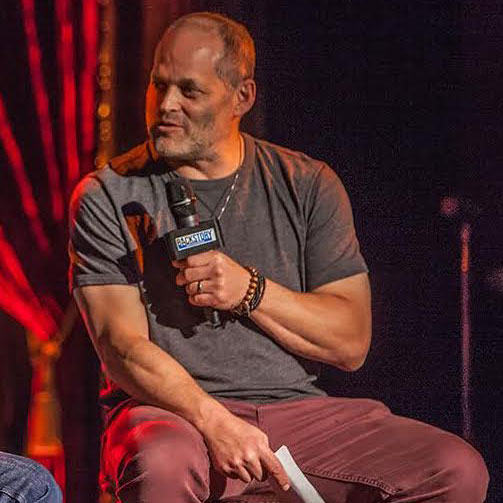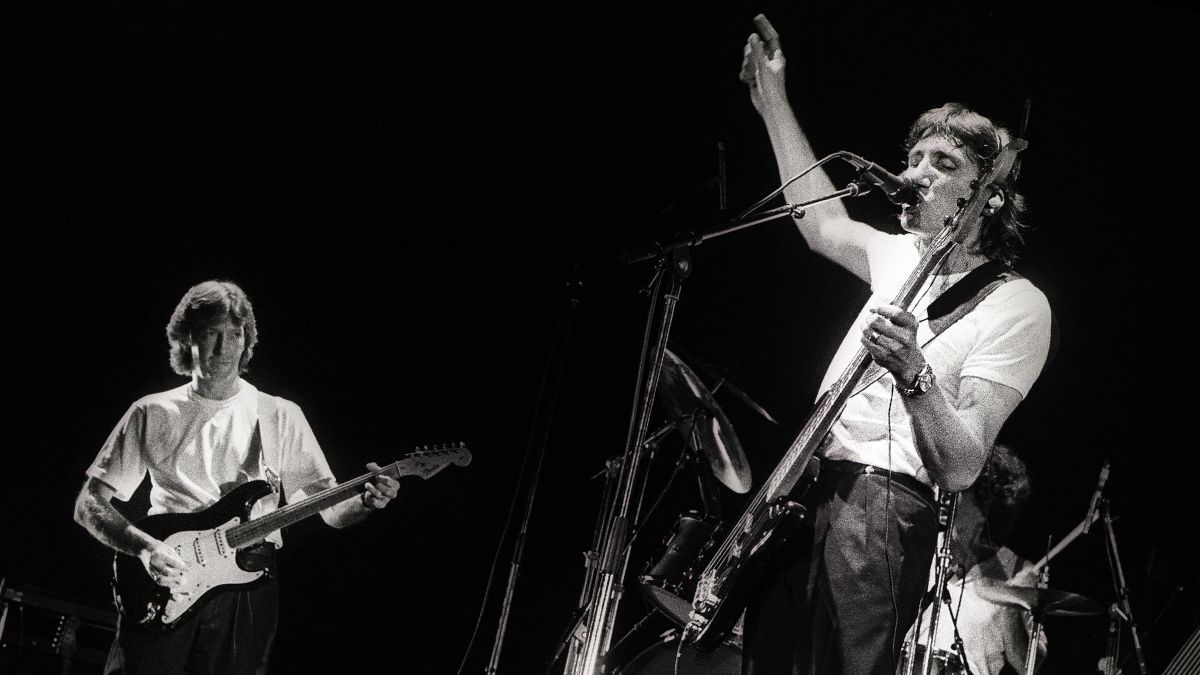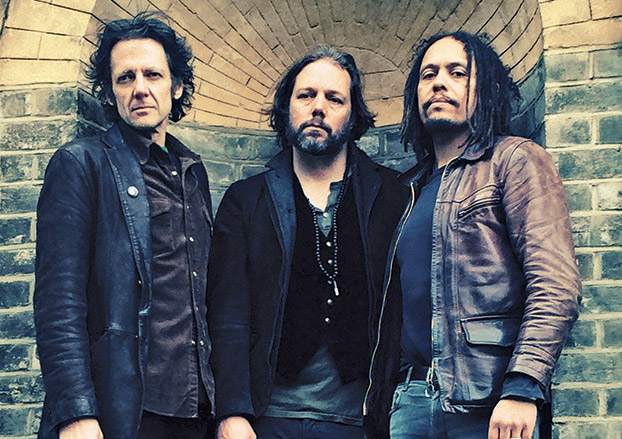
Rich Robinson wanted to do something special for the three studio sessions he performed last summer in front of live audiences in Woodstock, New York, to promote his solo album, Flux.
Something that would reward fans of the Black Crowes who had stuck with him while also scratching a decade-long itch of his own: he wanted to play for the first time in a decade with two longtime Crowes members, guitarist Marc Ford and keyboardist Ed Harsch. With bassist Sven Pipien already in his band, the sessions represented a four-man Black Crowes reunion.
“I knew it would be a treat for the fans, but also for me because I’ve always loved just listening to Ed and Marc play off of anything I played,” says Robinson. “As expected, it was an absolute pleasure. We all felt something lift, something special happening, and the audience felt it, too. Afterward, Eddie said, ‘We really have to make this happen.’ I went back on tour and started thinking about how to keep it going—and how to take it further.”
The result was the formation of a new band, the Magpie Salute, which debuted last January with four shows in New York, followed by four more in London in April. The Magpie Salute picked up the mantle of the Black Crowes, who have not performed together since 2013 and who failed to reunite for a discussed 25th anniversary tour in 2015 after more feuding between Rich and his brother, singer Chris Robinson.
The Magpie Salute have now released a self-titled debut, consisting of seven covers, including songs by Bob Marley, Delaney & Bonnie, Pink Floyd, the Faces, and the Band, and two Black Crowes tunes, “Wiser Time” and “What Is Home.” There is one new song, “Omission,” co-written by Robinson and John Hogg, which was the only track not from the Woodstock sessions. Hogg, a British singer who fronted Robinson’s band Hookah Brown in 2003, also overdubbed vocal tracks on several songs. The group is currently in the midst of a full tour, with shows planned into October.
“There was excitement from the first note, but there was a piece missing; we needed John, who I always felt a kinship with, both personal and creative,” says Robinson. “When he came in and we decided to start really touring, I thought it would be nice to have a record out to represent us, and I realized we had it!”
Sadly, Harsch never performed with the Magpie Salute, though he was at the heart of the idea. He died in November, two months before the group’s debut. “Ed was so excited and we were talking twice a day,” says Robinson. “Then I got a call that he was in a coma, and it was hard to process.”
All the latest guitar news, interviews, lessons, reviews, deals and more, direct to your inbox!
For many Black Crowes fans, the real news is the reunion of Robinson and Ford, who played together from 1992–97 and again briefly in 2005-06. Most fans consider the Robinson/Ford team to have been not only the band’s peak but one of the top modern blues-rock guitar duos, up there with the Allman Brothers Band’s Warren Haynes and Derek Trucks. It is thrilling to hear Robinson and Ford once again trading riffs and playing off one each other, now supplemented by Argentinian guitarist Nico Bereciartua. The rest of the band includes Pipien, drummer Joe Magistro, new keyboardist Michael Bellar and three other singers, including Charity White, who performed with the Crowes for years.
Struggles with addiction forced Ford out of the band in 1997, and he seems genuinely thrilled to have another opportunity to play with Robinson and return to the indelible music they created together.
“The whole experience is incredible,” says Ford. “When Rich called me, I had no ambition other than playing music with him. Getting back together and making up was the most important part. The music is easy. We can always do that. I just went to jam and it was an amazing time and it’s led to so much more than I ever anticipated.”
A lot of people seem to think you all made a very calculated decision to plunge back into the Black Crowes catalog, but that really doesn’t seem to be the case.
RICH ROBINSON This band came about in a very organic way. The more I play, the more I realize what an amazing gift it is to have such an easy relationship and deep connection to musicians where I play something and just anticipate loving what I hear coming back at me. We all just wanted to explore that more.
MARC FORD When I heard Rich wanted me to come to some type of jam, I said, “Whatever it is, yes!” I just never thought we were finished. It seems like the music created when we’re together is really powerful. It’s like we have a job to do. This music wants us involved. So this record is amazing to me. I got a copy and put it in my car and I had to pull over and sit and listen because I was weeping so hard: “Holy shit, this is a real band.” To have a chance to do it again—and to have it not be a jive trip about money, but an organic outgrowth—well, it’s really intense. It all grew out of an incredible weekend of jamming with no agenda.
John Hogg wasn’t part of that weekend. Was having him overdub vocals for the album a hard decision?
ROBINSON No. It wouldn’t have represented Magpie without John singing. We didn’t think we were going to make a record, but this was there, and it sounded great and it included Ed’s final performances and was an opportunity to let people know what we sound like. Then I realized that I had this song “Omission” that I really like, that John and I wrote for Hookah Brown. I had recorded a demo for Paper and just thought we should try to finish it while we were all together in the studio. I thought it was a great stepping stone for this band to record some original music.
FORD Adding John only adds. Rich had already done an amazing job of editing really long jams into the songs you hear. That’s how it goes with live albums and it’s fine. This was simply: Let’s make a record that shows people where we are coming from and keep us moving until we have more original material. It was very practical and the album happens to tell a beautiful, powerful story about the formation of a band.
Will you guys be producing more original music?
ROBINSON Definitely. I want to make a double album at the beginning of next year of original music written by me, Marc and John. I already sent them 15–20 ideas to get started but we’re also learning about 150 songs for the tour and everyone’s doing their homework. I know them all, so I have the easy part! Once we get on tour things will settle down. Our whole goal is to be a band and move forward, to honor the past, honor the Crowes and our solo material, honor the bands we loved growing up and explore where we are going from here.
The full ranks of the Magpie Salute photographed in early 2017 at Cooper Lake near Woodstock, New York
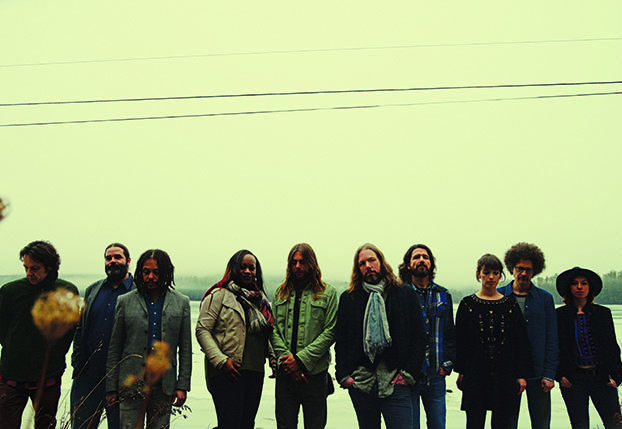
Is that a challenge when the fan base wants to hear the Crowes catalog and you play it so well?
ROBINSON No, because we’re never going to ignore the catalog even as we move forward—and I love the possibilities of what this band can do. When I got in a band it was because of how music made me feel and what it taught me: how to look at the world and humanity in a different way. Music has given me tremendous gifts: to travel, see the world, play with the Stones, Page, Neil Young, Bob Dylan…
I always only wanted to try and make people feel the way those heroes made me feel. If people felt the way I felt about Exile on Main St. when they listen to Southern Harmony, that’s an amazing thing. People loved the Crowes and those songs and I’ll always honor that, and I’m also really proud of the music, which is a huge swath of my life’s work. I’m proud of what we accomplished, not from a success standpoint, but that we were a great band, who made great records that people were moved by. When we played “Wiser Time” in Woodstock I could feel that the audience thought they might never hear this song again live, and when Eddie played his solo they all thought, I’ve been waiting to hear this since 2006!
FORD “Wiser Time” has become the epitome of us playing together. That was the high point, the “there it is” moment. I didn’t get into this gig or this life to put on a show. I’m a musician. I love making music and I love when the audience is involved in its creation, which sure is a lot more fun and it sustains your ability to keep doing it. I want it to be interesting for me every night. If I’m bored, I’m not going to make anything that interests you. We always keep ourselves on our toes. There’s no fun in trying to be perfect. You can hear it all on this song, along with an incredible solo by Ed.
Marc Ford with his Asher Guitars Electro Sonic
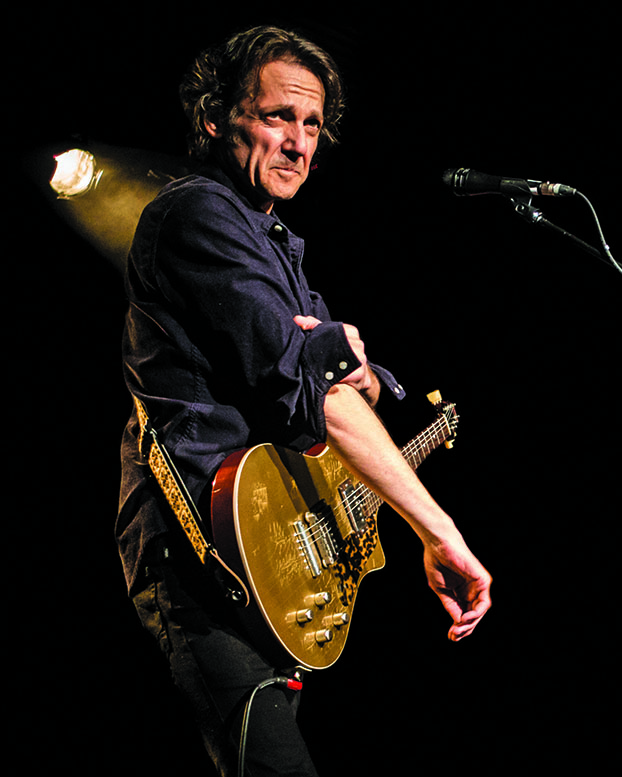
It’s so sad that Ed died before Magpie properly started, but it’s also beautiful that you guys got to play together again.
ROBINSON Yes! Ed played so well, and I’ve never seen anyone more excited or happier. It was almost like he was waiting to get all that out so he could leave.
FORD Eddie’s last recordings rightfully were with us. His solo on “Wiser Time” is just outstanding. We’re all going to go and it doesn’t surprise me that Ed is gone now. And damn, what if we didn’t have that? I got a weekend in a cabin, just me and him, and it was amazing.
Do you guys work out parts or just play?
ROBINSON We just play! I’ve never written in any kind of conventional way. I taught myself to play and I write by the measure not the count. Since the first time I met Ed, Sven and Marc, I just feel like they got it. I love what they would bring to my songs. Marc is such a deep and talented guitar player. Some guys can play a million notes and I can give a shit about them. Now think about Marc’s solo in “Sometimes Salvation,” where he hits a note and holds it and wrings so much emotion out of it. It was just fantastic to hear that coming from him again.
FORD Our playing together is instinctual. That relationship was just there as soon as we played again and now we’re developing it as a band beyond the two of us. We’re 13 days old at this point—that’s how many shows and rehearsals we’ve played—and I’m just starting to find where we can all sit, because every time we play together it gets better and more natural. I don’t think we’ve had enough time to gel to the point where no one has to worry about it. ROBINSON John came in and had a month to learn 85 songs because we played a different set every night in New York. A guitar player learns a part; a singer has to learn melody, pitch, lyrics and think about how he’s phrasing and developing a lyric.
And John has to figure out how to tackle Chris’ vocals, which could be a lot of pressure.
ROBINSON Yes, but the guy is incredibly talented and he’s bringing himself to the material while also honoring the songs. It’s actually very similar to what Chris did when we played Led Zeppelin music with Jimmy Page; he honored the songs but didn’t try to sound like Robert Plant. John is not mimicking Chris, and as he gets more and more comfortable with the catalog he will stake out his own approach even more.
How quickly did your playing together fall back into place?
ROBINSON Immediately. There wasn’t any adjustment. Marc arrived late because of plane problems, so we had zero time to even sit and talk or go over parts. He walked up and it was just there. People come and go, and the Crowes lost way too many members for no reason. You spend a lot of time on the bus and backstage with these people and develop very intense and unique relationships and it’s just weird to cut that off and never go back.
FORD There was no planning or getting ready. It was going to work or it wasn’t and that took a lot of courage for Rich. He had no idea how I was going to show up or what was going to happen.
It’s interesting to realize how much we defined each other. For years I didn’t hear or play a Black Crowes song or think about a Robinson brother, but my style was built in the furnace of that insanity, and Rich’s was, too. So when we come together, we’re just better. At the time, we were scared to death trying to survive and were forced into figuring things out, and that’s the way we’ll always play. What we play makes sense apart but it makes so much more sense together. It’s like, “I’m finally home.” That’s a powerful feeling; it’s what makes you you. Rich and I play together so well because we can’t play with anyone else! Sven, Joe and Ed all have the same relationship with Rich, so we all fell into it with one another immediately. This isn’t the Black Crowes. We do a bunch of the songs because Rich wrote them and they’re great songs, which we want people to hear, but we are a different entity and that will be more and more clear as we progress.
ROBINSON The difference now is we can develop a relationship without a big filter between us in the form of my brother. He’s hilarious and talented and brilliant, but when people would come around the Crowes they would come in with a preconceived notion of me from what Chris had told them and it probably wasn’t flattering—and Chris brought Marc into the band.
FORD Chris is a big personality. He’s incredibly talented and gifted and has charisma for days. So we were all in his orbit. He was the driving force and the reason that we all knew each other. Chris was the one who went out and made the relationships with people. I had a relationship with him before Rich. Musically, Rich and I developed this incredible relationship but now we get to actually see what all that’s made of, without that in-between person there. Brothers are brothers. If two guys are at odds, you have to choose.
The Magpie Salute’s John Hogg, Joe Magistro, Rich Robinson and Matt Slocum
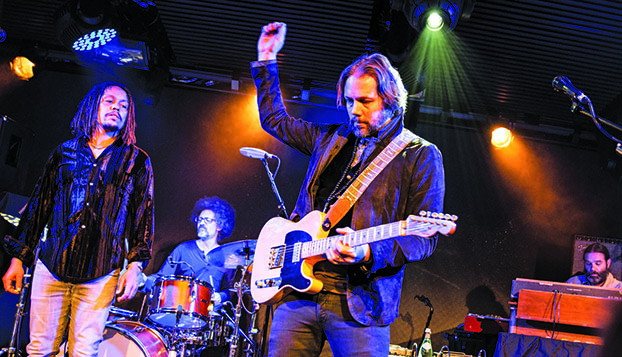
I interviewed Chris recently and he seems very happy and in a good place, and so do you, Rich. Is it just better for everyone this way, with each of you following your own musical visions and paths?
ROBINSON Yes. I absolutely think it’s better this way. All of us can feel the difference and it’s amazing. It’s imperative that we maintain positivity. There’s no more time for the negative horseshit and drama that surrounded the Black Crowes, and Chris was often the cause of it, but it was just how everything operated.
FORD There was a lot of conflict, which I believe Chris thrives on—so it always had to be there. Now it’s gone and everyone gets to have a minute.
ROBINSON To be in this band and play this music with these amazing musicians without all that drama is unbelievable—and the music is still just as good. Some people think great music comes from strife; well, we’ve all been through enough strife to draw on. We don’t need it in our daily lives.
Rich, you have sons. They are brothers. Has your relationship with Chris impacted your parenting at all?
ROBINSON I have five boys. Three of them are under the age of seven and my older two are grown up. We try to teach our kids to get along, that family is important and to support their brothers, but I realize they come to the earth the way they are and ultimately they’re their own people. When I look at whatever Chris and my relationship became, I don’t see anything that I could have done differently to help it, other than to give up who I am and go along with everything he wanted. I remember times where we were close and it sucks to not have that, but there were way more times we were at odds and fighting over petty bullshit that didn’t need to happen.
Why do you have a third guitar player with Nico? Does it change the way you two play together?
ROBINSON It was more just inclusion instead of exclusion. Nico was the guitar player in my solo band and I didn’t want to say, “Marc’s here. Fuck off.” And it’s worked out very well. He’s going to start playing some lap steel and mandolin, to be more of a utility player. He plays great slide and is very smart in his approach. He never overplays and he’s always there to support.
FORD He’s an amazing musician with great ears and he knows all of our parts better than we do, so he floats in between us, finishes the things we forget. He allows me to go where I’m instinctually going and make it all sound better. It was humbling to learn that Nico’s dream was to play with me and Rich, and here he is.
ROBINSON The way we met is pretty amazing. He sent me a video of himself playing one of my solo songs really well and I sent him a note thanking him. He was going to be at the Peach Festival when we played and wanted to meet. He seemed like a nice, cool, positive person so I invited him backstage and it felt like he was one of us already.
Why is Steve Gorman not in this band?
ROBINSON I called Steve and wanted him and Joe to play together. He said he was into it but he had to make sure of some scheduling issues; his radio show was getting re-upped and he said he couldn’t commit. Ultimately he couldn’t do it.
Marc, walking away from the Crowes must have been a very hard decision and it seems you felt you had to do it to survive and stay sober. That must make this opportunity all the more special.
FORD Absolutely! It’s part of the reason I pulled the car over and cried. I made decisions for the right reasons and put in a hell of a lot of work. For me and Rich to go, “Let’s forget it all and just play together” and instantaneously find ourselves right back to where it was, where it was supposed to be, playing music with an unfearful attitude and complete collaboration, it’s just incredible. We’ve all experienced life making music together and not doing so, and we prefer to have it. It’s not about us; the music we make is bigger than us.
ROBINSON When I would do a Crowes song with my solo band I could see the relief on people’s faces. They were there to support me and I understood it was because of the Crowes, who have always had incredibly supportive fans. There’s something incredible about that, now more than ever with so much of music falling by the wayside, going the way of movie theaters and major network television. The world’s changing, there’s a lot more to choose from and people tune out a lot, so I have reverence for the people who show up for my shows. To honor them, I’m going to play this music they want to hear. It’s all an honor.
Alan Paul is the author of four books, including Brothers and Sisters: The Allman Brothers Band and the Inside Story of the Album That Defined '70s as well as Texas Flood: The Inside Story of Stevie Ray Vaughan and One Way Out: The Inside Story of the Allman Brothers Band – both of which were both New York Times bestsellers – and Big in China: My Unlikely Adventures Raising a Family, Playing the Blues and Becoming a Star in Beijing, a memoir about raising a family in Beijing and forming a Chinese blues band that toured the nation. He’s been associated with Guitar World for 30 years, serving as managing editor from 1991 to 1996. He plays in two bands: Big in China and Friends of the Brothers (with Guitar World’s Andy Aledort).
